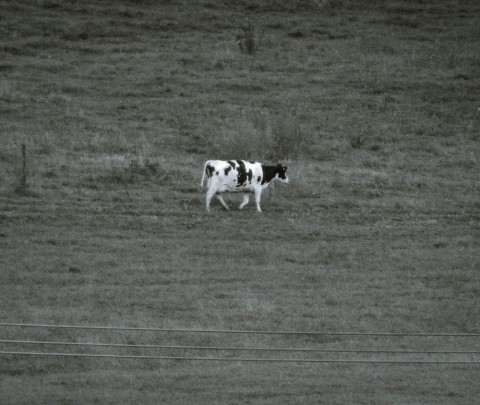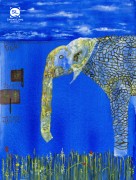Keisha is five when she realizes that she’s God. First it’s the taste. That unmistakable metallic tang, dancing across her taste buds, like sucking on a quarter, making saliva pool in her mouth and the spongy undersides of her tongue tingle with anticipation. Then the hair on her arms stands up and she hears a quiet crackling noise whispering around her, needling the skin on the back of her neck. Then—after the blue flash—all the cows at the metal feeder are lying on the ground, collapsed around her in a circle, front legs splayed flat and rumps in the air as if they’re bowing in prayer.
“Some kind of miracle,” says the man who always wears the red hat, muttering it over and over, bewildered, too miffed about his dead cows to be relieved over a live girl, even one that he was supposed to be watching. He tells Keisha not to sit in the feeder anymore. It’s too dangerous.
But Keisha can’t help it, because she likes cows. Practically the only thing she likes about this strange new place are the massive, gentle creatures, softly lapping up alfalfa hay with wide tongues and watching Keisha with serene eyes as she runs her hands through their short, wiry hair.
Keisha likes all cows, except for Miles Fratelli. Miles is a cow. He’s got grubby, pudgy fingers that he’s constantly using to barrage Keisha with an assortment of objects—paperclips, markers, little wads of paper clotted together with spit and boogers—from his desk in the back corner of Ms. Littleton’s room, just out of her eyeshot. He knows it’s easier for these objects to get stuck in the tight coils of Keisha’s hair than in Sophie’s silky blonde strands or Emily’s short red bob, and he likes to watch Keisha’s face melt with that confused, frightened, ultimately resigned look as she touches her fingers to the side of her head and realizes yes, that’s a glob of chewing gum and yes, the man with the red hat and his wife will have to chop another chunk from my hair with those kitchen scissors. The thought makes Miles positively shiver with delight. He pinches Keisha when nobody else is looking and calls her a foster-freak and the other day, he held her down, arms pinned underneath the dark, hidden confines of the twisted metal jungle gym, and wouldn’t let her up until she pressed her lips to his.
He tasted like chocolate milk and cheese crackers, Keisha remembers. She remembers every taste because there haven’t been that many—red slushies at the corner store, sweet, sticky air after a rain storm, sugar cereal in front of the flickering living room television— but she especially remembers the taste before the cows died. She needs to taste it again.
“No milk today, Keisha?” Lunch Lady Doris asks in her sing-song voice, ringing up Keisha’s peanut butter sandwich and small, hard apple. Keisha shakes her head, lightly touching the quarter through the pocket of her overalls to make sure it’s still there.
“Twenty-five cents,” at the kitchen table this morning, the man with the red hat grumbled as he handed Keisha the dirty quarter, still bewildered, always bewildered. “We have buckets of the stuff outside.”
At recess, Keisha remembers the way the cows bowed to her at the feeder. She watches Miles stomp across the playground, violently kicking over anthills, smearing the sand and ants on the pavement with his light-up Velcro sneaker. She keeps watching Miles as he grasps the metal jungle gym with two hands. Miles is a cow, and she’ll make him bow like the others.
She tucks the quarter into her mouth and waits.

Notes from Guest Reader Sharmini Aphrodite
What struck me immediately about this piece was the confidence of its opening. I also enjoyed how cleanly the writer slipped into the skin of childhood: its strange, raw violence, how class is braided into playground politics. Milk Money was fleet-footed in how natural it felt.


 The core workshop of SmokeLong Fitness is all in writing, so you can take part from anywhere at anytime. We are excited about creating a supportive, consistent and structured environment for flash writers to work on their craft in a community. We are thrilled and proud to say that our workshop participants have won, placed, or been listed in every major flash competition. Community works.
The core workshop of SmokeLong Fitness is all in writing, so you can take part from anywhere at anytime. We are excited about creating a supportive, consistent and structured environment for flash writers to work on their craft in a community. We are thrilled and proud to say that our workshop participants have won, placed, or been listed in every major flash competition. Community works.